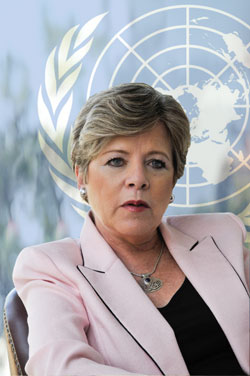"It Is Time to Increase the Participation of Countries in the Region in Multi-Lateral Governance and Agenda"
Topic(s)
The Executive Secretary of ECLAC participated in a meeting that examined development strategies in Latin America and the Caribbean. She presented a 2011 balance, as well as prospects for 2012.

(19 March 2012) The agenda of multi-lateral bodies needs to be broadened in order to include not only global financial and economic topics, but also specific areas that are of particular interest to developing countries and Latin America and the Caribbean, as noted by the Executive Secretary of ECLAC Alicia Bárcena.
The UN High-level Official elaborated on the balance and prospect of the Latin American and Caribbean economy for 2011-2012 at the event Reunión de Altas Autoridades Económicas. Modelos de Desarrollo en América Latina. Búsqueda de Convergencias y Complementariedades (High-level Economic Authorities Meeting. Development Models in Latin America: Searching for Convergence and Complementarity), held on 16 March at the Latin American Integration Association (ALADI) headquarters.
At the meeting convened by ALADI, the Andean Development Corporation (CAF), the Economic Commission for Latin America and the Caribbean (ECLAC), the Ibero-American General Secretariat (SEGIB), ministers of economy and high-level authorities from member countries of these organizations discussed searching for complementarities among the different visions and economic and social projects that are paramount in the Latin American context.
In her presentation, Alicia Bárcena mentioned that it is necessary to foster the joint participation of Latin American and Caribbean countries in decision making and global governance.
To achieve this, "the structure of decision-making bodies within multi-lateral organizations must be reviewed, as well as quotas allocation mechanisms, so that contribution levels be assigned according to the countries' economic weight, and based on developing countries' and regional needs," remarked Bárcena.
She also emphasized that protecting emerging markets against the flow of foreign capital and especially the need to increase the growth potential of developing countries are issues to be included in multi-lateral organizations' agendas for consistency with international, regional and national policy goals.
In her balance and prospect for the Latin American and Caribbean economy, Bárcena recalled that, while the region has shown positive indicators, such as an increase in exports of 23% during 2011 and a reduction of the unemployment rate from 7.3% in 2010 to an anticipated rate between 6.6% and 6.8% in 2012; regional growth will show a slowdown from 4.3% (2011) to 3.7% this year due to international economic turmoil - especially the alarming situation in Europe, which is already having serious impacts such as an increase in inflation and a deficit in the current account.
"We have partially restored the fiscal sector - especially because of an income increase; however, we are still facing serious public finances challenges in our countries," highlighted the Executive Secretary. Among such challenges, she mentioned poor tax collection, a low distributive impact of social expenditure and still insufficient investments for development.
For questions, please contact ECLAC's Public Information and Web Services Unit. E-mail: dpisantiago@cepal.org ; Tel.: (56 2) 210 2040.
Follow us on: Twitter, Facebook, Flickr and YouTube.
Contact
Public Information Unit
- prensa@cepal.org
- (56 2) 2210 2040